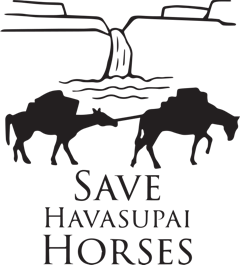It's About Compassion
In early 2016, several individuals came together out of compassion to help improve the lives of the Havasupai pack animals by calling for the cessation of violence against them, and the adoption of a standard of care for them. The group's volunteers, as well as its supporters, have been deeply affected by the plight of the pack animals in the canyon, whether by witnessing it in person, or feeling it from afar.
Exposing the Secret
Despite the exquisite beauty of Havasu Falls, there has long been a dark secret hiding in the corners of the village and under the packs and saddles of far too many animals. Horses, mules and donkeys have been transporting gear and tourists along the 8-10 mile trail into and out of the canyon for decades, yet their story of abuse has largely gone untold. Through the efforts of SAVE and its supporters, the secret is finally being exposed, and the story is being told.
While some of these hard-working animals are in moderate to good condition, tourists continue to describe many that are grossly underweight, some with open wounds from ill-fitting gear. Others have been seen working despite broken limbs. While we know that some wranglers are known to take better care of their animals than others, we also know that horses and mules are commonly introduced to the string and worked to their ultimate death, or released to the mesas when they become unusable, to fend for themselves.
Tourists have witnessed blatant physical abuse in the form of violent beatings of these pack animals, even to their eyes. It is common for these animals to be subjected to intensely long periods of uninterrupted work carrying burdens beyond their strength without any breaks, food, water or rest. Not surprisingly, many horses, mules and donkeys have lost their lives to the long-term effects of those conditions. Horrifically, it is not uncommon for entire strings to fall of switchbacks and suffer grave injuries. Some are left to die on the side of a trail, or are ravaged by dogs. It is a fact that feral dogs live on the canyon trail because of this "food supply."
Changing History
On Thursday, May 12, 2016, wrangler Leland Joe pleaded guilty to two of four counts of animal abuse. This is the FIRST case where the federal government has brought animal abuse charges against a tribal member and won. This shameful "torture," as noted in federal court by Lt Randy Servis of the Arizona Department of Agriculture, occurred on the Havasupai region in the Grand Canyon. SAVE is proud to have been a part of this effort. We are hopeful that this landmark event will set a precedent for any future abusers to be held accountable for their actions - preferably by the Havasupai Tribal Council itself.
Why Violence Against Animals Matters
It is imperative that society, as a whole, understands the link between animal violence and human victimization (Ascione and Arkow, 1999). Until we recognize and are willing to change this, violence against animals will continue to fuel violence against vulnerable humans.
“Cruelty to animals can, of course, be viewed as something we should disapprove of. But the issue is far deeper than that. When we mistreat and abuse animals, we actually diminish our humanity, rejecting our capacity for compassion and condoning actions that spring from the darkest regions of our nature. Animal cruelty shrouds the best we can be.”
— Shumaker, as cited in Reporting Animal Cruelty, 2016
Violence against animals anywhere is violence against our very humanity everywhere.

